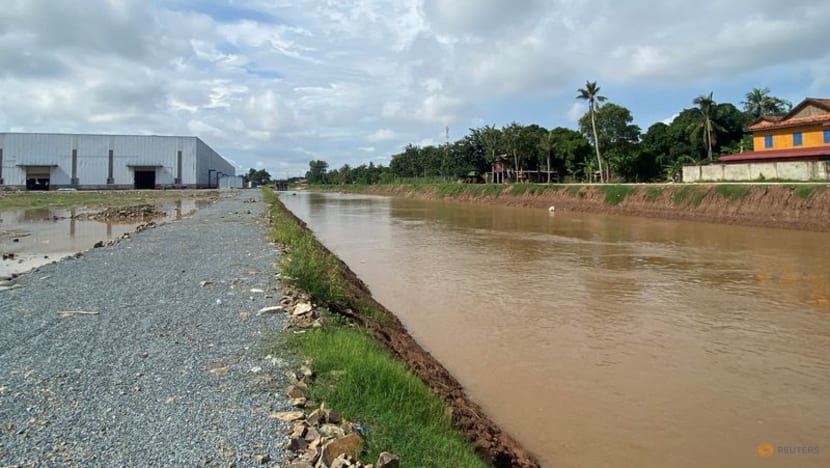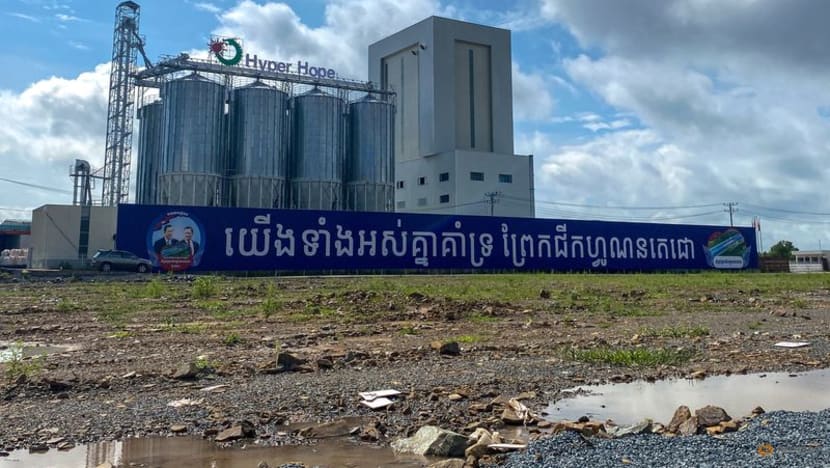
A waterway from a part of the Mekong River near the site where the groundbreaking ceremony was held in August 2024 to begin construction of the Funan Techo Canal at Prek Takeo, east of Phnom Penh, Cambodia Oct 16, 2024. (Photo: REUTERS/Francesco…see more
23 Nov 2024 03:00PM
23 Nov 2024 03:00PM
PHNOM PENH: At a ceremony in August, Cambodia's leader Hun Manet knelt to receive blessings from saffron-robed monks as fireworks and balloons heralded the breaking of ground for a canal he hopes will transform his country's economic fortunes.
Addressing hundreds of people waving the Cambodian flag, Hun Manet said China would contribute 49 per cent to the funding of the Funan Techo Canal that will link the Mekong River to the Gulf of Thailand and reduce Cambodia's shipping reliance on its neighbour Vietnam.
Cambodia's government estimates the strategic infrastructure project will cost US$1.7 billion, nearly 4 per cent of Cambodia's annual gross domestic product.
But months later, China's financial contribution remains in doubt.
Four people directly involved in the investment plans or briefed about them told Reuters Beijing has expressed misgivings about the project and has not made definitive commitments on its funding.
"It is normal business practice for Chinese companies to assist Cambodia in exploring the construction of comprehensive water conservancy projects in accordance with market principles," China's foreign ministry said in an emailed statement to Reuters when asked about the canal.
Addressing hundreds of people waving the Cambodian flag, Hun Manet said China would contribute 49 per cent to the funding of the Funan Techo Canal that will link the Mekong River to the Gulf of Thailand and reduce Cambodia's shipping reliance on its neighbour Vietnam.
Cambodia's government estimates the strategic infrastructure project will cost US$1.7 billion, nearly 4 per cent of Cambodia's annual gross domestic product.
But months later, China's financial contribution remains in doubt.
Four people directly involved in the investment plans or briefed about them told Reuters Beijing has expressed misgivings about the project and has not made definitive commitments on its funding.
"It is normal business practice for Chinese companies to assist Cambodia in exploring the construction of comprehensive water conservancy projects in accordance with market principles," China's foreign ministry said in an emailed statement to Reuters when asked about the canal.
The Chinese ministry did not answer a direct question about the funding but said the two countries were "ironclad friends", a comment echoed by Hun Manet in late October.
Cambodia's government declined requests for interviews, and its press officers did not reply in recent weeks to requests for comments about the canal's funding.
After Reuters published this article, Cambodia's ministry for public works said late on Friday that the story and other media accounts of implementation problems with the canal were "not true" and were "without clear basis".
"The working group on the project has been actively progressing by cooperating with national and international institutions, contrary to what is stated in the news," the ministry said in a statement. It did not mention China or say anything about funding for the project.
The ministry and a government spokesperson did not immediately respond on Saturday to Reuters requests for clarification.

A view of the site where the groundbreaking ceremony was held in August 2024 to begin construction of the Funan Techo Canal at Prek Takeo, east of Phnom Penh, Cambodia Oct 16, 2024. (Photo: REUTERS/Francesco Guarascio)
China's lack of clear commitment could jeopardise the entire plan, given uncertainty over the project's costs, its environmental impact and financial viability, experts, officials and diplomats say.
It also underscores how Beijing is drastically downsizing its overseas investments as its domestic economy struggles, even in countries it considers strategic partners, such as Cambodia.
Once a prime example for Western-backed "nation-building" after the long civil war that followed the fall of the Khmer Rouge regime, Cambodia has in recent times been widely seen by diplomats and foreign policy experts as a Chinese client state, owing to Beijing more than one-third of its total state debt.
But Chinese investment in the Southeast Asian nation is now plunging, after a series of unsuccessful infrastructure projects, amid concerns over criminal gangs targeting Chinese nationals, and dropping tourist numbers.
DIFFERING NARRATIVES
The 180km canal would greatly expand an existing waterway and divert water from the fragile rice-growing Mekong Delta to the Gulf of Thailand, cutting Cambodian shipping through Vietnamese ports.
In the months after the Cambodian government signed an "investment framework agreement" in October 2023 with China Road and Bridge Corporation (CRBC), a state-owned construction company, Cambodian officials went public about China's financial involvement. The text of the deal is not public.
In an interview with Reuters in May, the minister in charge of the project, Deputy Prime Minister Sun Chanthol, said CRBC would develop the canal and "totally" cover its costs, getting a multi-decade concession in return.
But at the August groundbreaking, the prime minister put CRBC's share in the project at 49 per cent, with the remainder covered by Cambodian companies.
The same day, his father and Cambodia's decades-long leader Hun Sen posted a statement on Facebook calling on Japan to invest in the canal.
China's official Xinhua News Agency did not mention any Chinese involvement in its report about the groundbreaking.
A few days later, a communications officer for Sun Chanthol told Reuters that ownership for the canal's section to be developed together with CRBC remained "to be determined".
When asked about Cambodian assertions that CRBC would have a 49 per cent stake, an official for the company told Reuters in mid-October the figures circulating publicly were not definitive.
"It's very complicated," said the official, who did not elaborate.
The 180km canal would greatly expand an existing waterway and divert water from the fragile rice-growing Mekong Delta to the Gulf of Thailand, cutting Cambodian shipping through Vietnamese ports.
In the months after the Cambodian government signed an "investment framework agreement" in October 2023 with China Road and Bridge Corporation (CRBC), a state-owned construction company, Cambodian officials went public about China's financial involvement. The text of the deal is not public.
In an interview with Reuters in May, the minister in charge of the project, Deputy Prime Minister Sun Chanthol, said CRBC would develop the canal and "totally" cover its costs, getting a multi-decade concession in return.
But at the August groundbreaking, the prime minister put CRBC's share in the project at 49 per cent, with the remainder covered by Cambodian companies.
The same day, his father and Cambodia's decades-long leader Hun Sen posted a statement on Facebook calling on Japan to invest in the canal.
China's official Xinhua News Agency did not mention any Chinese involvement in its report about the groundbreaking.
A few days later, a communications officer for Sun Chanthol told Reuters that ownership for the canal's section to be developed together with CRBC remained "to be determined".
When asked about Cambodian assertions that CRBC would have a 49 per cent stake, an official for the company told Reuters in mid-October the figures circulating publicly were not definitive.
"It's very complicated," said the official, who did not elaborate.

No comments:
Post a Comment